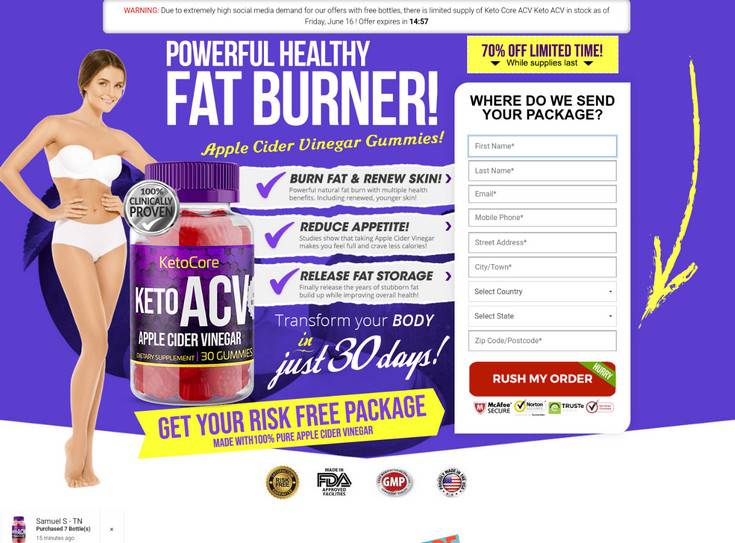A hot new weight loss scam is capitalizing on the hype around keto diets and apple cider vinegar. Fraudulent websites are using fake celebrity endorsements, fabricated testimonials, and AI-generated videos to promote “Keto ACV Gummies” as a miracle cure for obesity. These keto gummy scams feature clips that appear to show Good Morning America hosts endorsing the product and people achieving dramatic weight loss results.
In reality, the videos are manipulated using deepfake technology. No such segments have aired on GMA, and the weight loss claims are completely fabricated. The scammers are preying on vulnerable consumers desperate for an easy solution to lose weight fast. Their aim is to trick people into paying inflated prices for keto gummies with ACV that likely contain minimal effective ingredients.
It’s important to be aware of the deceptive tactics these keto ACV gummies scams utilize. They combine the believability of fake GMA endorsements with misleading claims that keto and ACV supplements can offer rapid, substantial weight loss. But no magic pill or gummy can replace proper nutrition, exercise, and healthy lifestyle habits. This article will uncover how these scams work so you can protect your health, money, and personal information.

Keto ACV Gummies Scam Overview
Keto diets have surged in popularity for their ability to put the body into a fat-burning metabolic state called ketosis. Meanwhile, proponents claim apple cider vinegar offers a range of health benefits. As the keto diet and apple cider vinegar have gained mainstream acceptance, scammers are capitalizing by promoting “keto gummies with ACV” as weight loss miracles.
These scams tend to follow a familiar pattern. They feature fake celebrity endorsements, false testimonials, and dubious health claims about gummies that supposedly harness the powers of keto and ACV for easy, rapid weight loss.
One recurring scam uses fake Good Morning America (GMA) segments to promote keto ACV gummies as a breakthrough endorsed by the show. Various versions of the scam have claimed GMA profiles of Marsha Parker, Lindy Cellucci, Shawna Tindal, and others as proof the gummies result in dramatic weight loss.
The scam intersperses fake GMA videos with a long sales pitch making outrageous claims about keto gummies and ACV. Supposed “before and after” photos, celebrity endorsements, and medical professional testimonials are fabricated. Images may be altered or stolen from real people who have never used the product.
No such GMA segments exist, and the scammers are selling overpriced, ineffective gummies under false pretenses. Their goal is to capitalize on interest in keto and ACV to scam people hoping to lose weight easily. Avoid these fake promotions, and be wary of “miracle” weight loss gummies making implausible claims.
How the Keto ACV Gummies Scam Works
The typical keto ACV gummies scam starts with a fake GMA segment. For example, a scam may claim “Marsha Parker Lost 62 Lbs Just Weeks After Taking These Keto Gummies!” It shows what appears to be footage from GMA featuring host Robin Roberts interviewing “Marsha Parker” about her weight loss journey.
This is accompanied by a fake USA Today headline reading “GMA Reveals Secret of How Three Moms Featured in People’s Annual ‘Half Their Size’ Issue Lost Half Their Body Weight Just Over Few Months.”
The video uses AI-generated footage, often referred to as “deepfakes,” to simulate a real GMA segment. The “Marsha Parker” seen on screen is fabricated. No such guest has appeared on GMA.
After the fake segment, an extensive sales pitch makes dramatic claims about keto ACV gummies being the secret to the rapid weight loss. This includes more AI-generated footage and fake testimonials.
For example, the scam claims GMA host Chris Powell stated, “When GMA approached me about these Keto Gummies with Apple Cider Vinegar I was skeptical. But after looking at the clinical trials, I am excited to get this revolutionary product into the hands of those struggling to lose weight.”
Dr. Jen Ashton, GMA’s chief medical correspondent, is also quoted praising the gummies despite never having endorsed any such product.
Other fake elements include:
- False claims that Lindy Cellucci and Shawna Tindal, people who have appeared in People’s “Half Their Size” issue, also lost weight using the gummies after being featured on GMA.
- Fake endorsements from celebrities like Drew Barrymore who allegedly lost 25lbs in 6 weeks thanks to keto ACV gummies.
- AI-generated videos of doctors, scientists, and regular people sharing glowing testimonials about their weight loss from keto gummies with ACV.
- Fake logos from media outlets like USA Today and BBC meant to look like news reports endorsing the gummies.
- False claims the gummies were an instant hit on Shark Tank, with investors fighting to invest millions.
- Misleading claims the gummies are “clinically proven” to cause rapid weight loss and have no side effects.
- Lies about limited supplies and fake countdown timers pressuring consumers to order quickly before supplies run out.
All these outlandish claims aim to convince consumers that hosts and medical experts from GMA have validated keto gummies with ACV as a weight loss miracle. The scammers hope the supposed endorsements will manipulate people into buying their overpriced supplements.
In reality, no such segment has ever aired on GMA, and none of these people have claimed keto ACV gummies led to substantial weight loss. The scammers are relying on the believability of the AI-generated footage and social proof from false testimonials.
Red Flags of the Keto ACV Gummies Scam
Warning signs that a keto ACV gummies promotion is an outright scam:
- Claims of celebrity endorsements, especially from TV shows, are frequently fake unless confirmed. Be skeptical.
- Websites appear hastily put together, often with typos and formatting issues.
- Claims that the gummies offer easy, fast weight loss without needing to diet or exercise. Real weight loss requires lifestyle changes.
- Aggressive sales tactics insisting you act now before supplies run out, you miss discounts, etc.
- No transparency about ingredients or dosages. Oftentimes gummies contain minimal keto and ACV ingredients.
- No customer reviews readily available. Lack of feedback raises questions.
- Offered through third-party retail platforms like Clickbank with inflated prices and auto-billing.
- Refunds are tied to unreasonable conditions, like needing to use the gummies for several months.
When in doubt, look up the gummies by name and company name specifically to find reviews exposing the scam. And remember, no fitness experts from GMA have promoted keto ACV gummies for weight loss. Maintain a healthy skepticism if you encounter such claims.
What to Do If You Fall Victim to the Keto ACV Gummies Scam
If you placed an order and provided your credit card information, take action quickly to avoid being charged for an overpriced, fraudulent product:
Call your credit card company immediately. Ask to cancel the transaction and have any charges removed from your account. Explain that the order was placed under fraudulent pretenses so the charge amounts to unauthorized use of your card.
Dispute the charges. If charges cannot be reversed, dispute them with your card issuer as fraudulent. Provide details about the invalid celebrity endorsements, AI-generated videos, and other red flags.
Issue a credit card chargeback. If disputing the charges doesn’t work, file for a chargeback. Chargebacks allow reversal of charges when a product or service differs significantly from what was described at the time of purchase. Make it clear the keto gummies are not the miracle product claimed.
Cancel any recurring orders or subscriptions. Many scams autoship new orders and bill your card monthly. Contact the merchant immediately and direct them to cancel your account and any future shipments or charges.
Mark emails from the company as spam. This will prevent you from being tempted by any future scam offers from the same fraudsters and remove visibility into your purchase history.
Contact the FTC. File a complaint with the Federal Trade Commission (FTC) about the deceptive business practices, fake testimonials, and false scarcity marketing. The more consumers report these scams, the more power regulators have to shut them down.
Warn others. Leave reviews about the scam online to spread awareness and prevent others from falling victim. The more light shed on these shady practices, the less these scammers can take advantage of consumers.
Keto ACV Gummies Scam FAQs
Are keto gummies and apple cider vinegar effective for weight loss?
There is limited evidence that keto gummies or ACV supplements markedly contribute to weight loss for most people. The keto diet itself can assist weight loss through ketosis. ACV provides minimal metabolic benefits. But scammers grossly exaggerate these effects while providing minimal keto and ACV ingredients. Lifestyle changes like diet and exercise are necessary for significant, lasting weight loss.
What ingredients are typically in these gummies?
It varies, but the gummies often contain minimal quantities of BHB (beta hydroxybutyrate) salts for ketosis, plus apple cider vinegar powder and generic filler ingredients. Amounts of keto and ACV ingredients may be too low to produce any benefits. And BHB salts can cause side effects like diarrhea in some people.
Are the GMA endorsements and testimonials real?
No. These scams routinely fabricate celebrity endorsements, doctor recommendations, and user testimonials using AI and manipulation techniques. No medical experts from GMA have promoted keto ACV gummies. All shown endorsements and weight loss photos should be assumed fake unless verified independently. Approach miraculous claims with skepticism.
Are the gummies FDA approved?
No supplements are approved or evaluated by the FDA. Scammers may falsely claim FDA approval to seem legitimate. The FDA doesn’t verify supplement effects or safety.Responsible manufacturers submit to third-party quality testing like cGMP certification, which scammy keto gummy brands fail to undergo.
Can I get a refund?
Scammers make refunds difficult or impossible to deter complaints. But issue chargebacks if needed, since the gummies are misrepresented. Avoid companies refusing reasonable refunds for products not as advertised.
Are there risks if I try the gummies anyway?
Yes. In addition to paying the inflated prices, the gummies could be contaminated or contain allergens, especially when manufacturers are unknown. Side effects are possible from ingredients like BHB salts. And entering credit card information on shady sites risks identity theft. Only buy vetted brands from reputable retailers.
Avoid the Keto ACV Gummies Scams
Keto ACV gummies scams prey on the hopes and vulnerabilities of consumers wanting an easy path to weight loss. They utilize sophisticated tricks to seem credible, including AI-generated video content and fake celebrity endorsements. Remember, extraordinary claims require extraordinary evidence. Maintain a healthy skepticism when evaluating weight loss pill or gummy claims to avoid these blatant scams.
If you’re seeking legitimate keto supplements, look for reputable brands with transparent ingredients and dosages. And know that no pill or gummy can replace improved nutrition, portion control, regular exercise, and lifestyle changes. Safe, sustainable weight loss takes time and commitment. Don’t believe promises of rapid weight loss without effort. Protect yourself and your wallet by being an informed consumer.


